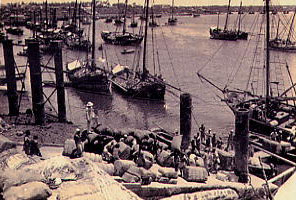|

 | |  | |
The following are memories recalled by Mansukhlal B. Maru, as recorded by Hanover Housing Association in their book 'Tale of the Century' published in 1999.
It was 1942, war had started in Europe and was knocking on the door of East Africa. I was in elementary school in Mombassa.
Before classes each morning, at 7.45, we assembled on the school playground where we would hoist the British flag, sing the National Anthem, and listen to advice from the Principal on how to go and come out from the trenches when the siren sounds.
School was situated midway between the airport and harbour and I could see from the class window that the military were constantly going towards the harbour. At 12.45 we would go home.
Our home was about a mile from the sea and one highly memorable day in that year my twin brother and I were on the shore watching the warships in the harbour when the siren was sounded. We were both very afraid, but all we could think was that we must get home.
We ran fast through the deserted streets, it was pitch dark and searchlights were scanning the sky. We could hear the military police shouting 'Zima Taa' (Swahili for 'Switch off your lights'). They started arresting civilians, including my brother and me. The policeman was kind and instead of forcing us to go to the trenches he gave us a lift home.
The next day we heard that two Italian planes had dropped bombs on Malindi Town. Had they succeeded in dropping them on Mombassa harbour, the consequences would have been as bad as at Pearl Harbour, because most of the British Navy was there.
Mombassa was an international harbour, used by the navy for taking petrol and controlling the British Colonial Territories, The Middle East and India. There was more to come. It is often said that we are 'the lost generation'.
 There is another strange tale to relate from East Africa. I was working at the Lint and Coffee Marketing Board of Uganda and my job was to supervise tally clerks off-loading coffee and cotton. I received a phone call from the port. Our area, which was about 10 miles away from Mombassa, was considered dangerous and so we always travelled in convoy. There is another strange tale to relate from East Africa. I was working at the Lint and Coffee Marketing Board of Uganda and my job was to supervise tally clerks off-loading coffee and cotton. I received a phone call from the port. Our area, which was about 10 miles away from Mombassa, was considered dangerous and so we always travelled in convoy.
The night was pitch dark, the rain was hammering down on the black tarmac road, the street lights were hardly visible, the cows in the nearby fields were bellowing and there were dogs barking in the distance. The sound of the high waves of the sea added to the feeling of danger and I was very apprehensive as I drove towards the port.
We were all driving very slowly down the hill and could see Killindini harbour and the lights of the ships. When the lightning flashed we could see the surrounding areas. Just as our seven cars were passing under the railway bridge, I saw a very beautiful Indian girl wearing a white sari and gold jewellery, walking in the middle of the road.
I stopped the car and asked her, 'Sister, where are you going alone at this time? The area is very dangerous - would you like a lift?'
She replied, 'Brother thank you, but my car is being repaired and my mechanic is on his way to pick me up'. I saw a flash of light and she disappeared.
There were some very strange things about this incident. The girl was walking in the rain but was not wet, and instead of going to town she was going towards the sea.
Besides, we had not passed any breakdowns, and why had she not waited in her car? When I stopped, all the other drivers in the convoy had to stop and later they asked me why I had done so. Not one of them had seen the girl!
The next day, I visited the same place and was told by the nearby residents that an unknown girl was often seen there. She appeared wearing various types of dress -- sometimes she was European, sometimes African and sometimes Arab.
| |  | |  |
To add a comment you must first login or join for free, up in the top left corner.
|
|


